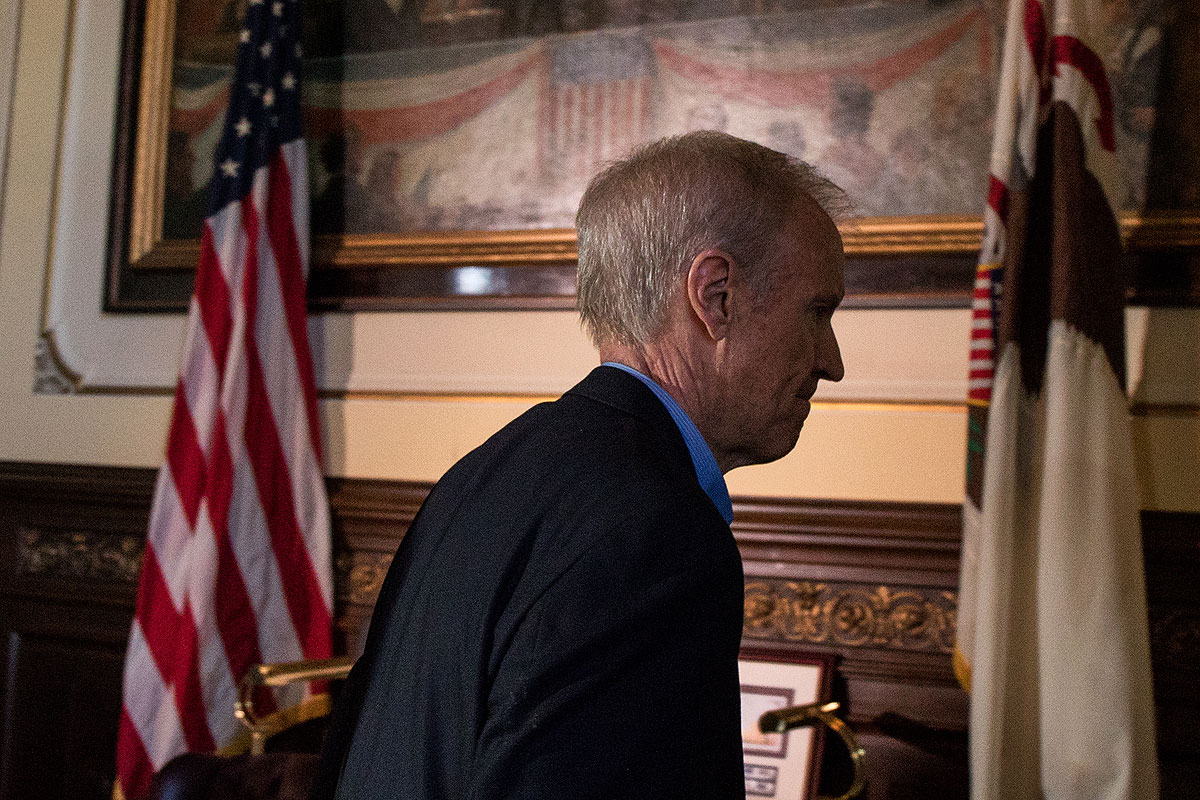Tomorrow the Illinois House could—and is likely to—vote to override Governor Bruce Rauner's recent veto of a budget bill. The Senate has already done so, as Amanda Vinicky explains in a thorough piece about recent happenings in the capital. So the House vote could give Illinois its first real, non-autopilot budget in three years.
Is it balanced? Ehh… it relies on assumed pension savings, so not exactly. But by the standards both sides, including the governor, have set over the past couple years, it's "balanced."
Assuming that happens (it's not guaranteed but it's probable, given the behind-the-scenes vote-buying and/or scaring) the state can return from this brief interregnum of legislating and get back to the 2018 election with mere 17 months to go.
And it could get ugly. There's an interesting nugget in Rich Miller's piece on the sudden retirement of GOP Senate leader Christine Radogno, regarding a 2015 backroom meeting:
Rauner reportedly referenced the $20 million sitting in his campaign fund at the time and said he wanted to be their partner in the upcoming session and would support those who supported him.
And then the hammer came down. Multiple credible sources told me the governor informed the Senate Republicans he would ask for their votes on 10 issues and that he absolutely needed all of their votes on all 10 items. Not five, not seven. Ten. And if anyone in the room didn't vote for all 10, then they'd have a “(expletive that begins with an ‘F’ and ends with an ‘ing’) problem" with him.
(Speaking of Radogno, it's well worth reading Phil Kadner's most recent column on Radogno. As a freshman senator, she voted to kill a plan to trade an income tax hike for lower property taxes and school funding reform, which the legislature has been circling around lately.)
Only one Republican Senator jumped onto the Democrats' budget bills: Dale Righter, whose profile is similar to Sam McCann, the downstate Republican representing a government-employee-heavy district who survived a primary challenge in 2016. Righter is experienced, conservative, and popular, and would be a fearsome target, should Rauner attempt to retaliate by funding a primary challenger. On the House side, if the override vote is identical to the initial passage of the tax-hike bill, that's 16 Republicans whom Rauner would plausibly need to target.
Plus, as Governing's Daniel C. Vock noted on Twitter, passing the tax hike now may keep it from becoming an important factor on the gubernatorial race.
2/ In other words, by taking tax hike need off of the 2018 Dem nominee, does a tax hike now make it easier for a Dem to defeat Rauner? https://t.co/QYmXW1dfaV
— Daniel C. Vock (@danvock) July 5, 2017
It sets up a brutal 2018 for Rauner, whose unpopularity makes him one of the more vulnerable governors in the country, if not inevitably doomed. Or does it? Greg Hinz reports an interesting spin: "Rauner himself is the biggest potential loser, as Republicans in both the House and Senate voted to pass a tax-and-spending plan that he opposed. But some believe the GOP incumbent may be able to use that to his advantage in his re-election campaign, arguing that he needs a new term and more Republicans with him to get Illinois back on track."
The main reason Illinois has gone so long without a real and even remotely balanced budget is that the political incentives have aligned against one. As Rauner's Turnaround Agenda was slowly picked apart, the value of a big win for him increased, as did the incentive for Democrats to prevent one. Only the threat of junk-bond status and closed schools finally outweighed these incentives for Democrats and a substantial number of Republicans.
Junk-bond status is not, apparently, enough of a deterrence for Rauner. Why not? Again, look to what his incentives are. Taking a big L is not, in and of itself, a W—but he may very well view the alternative as worse.



